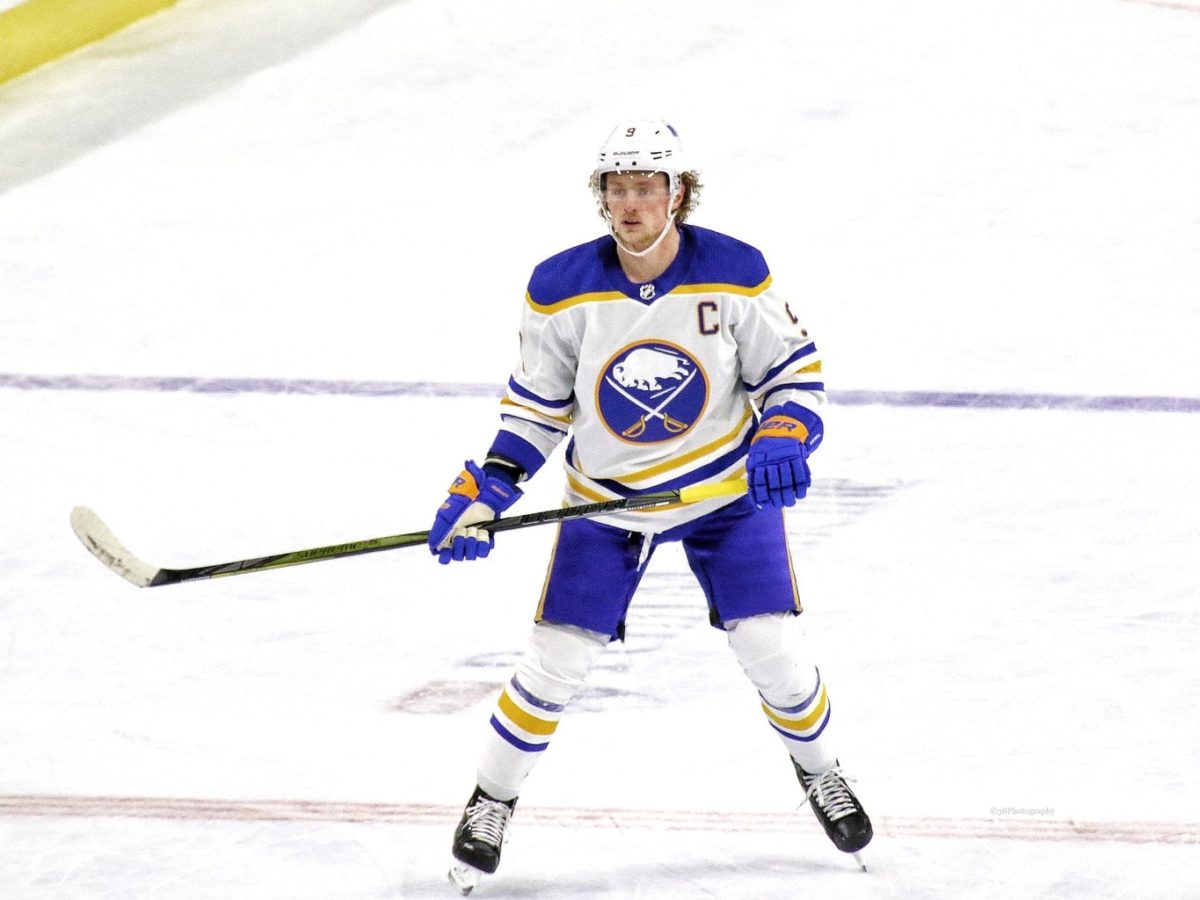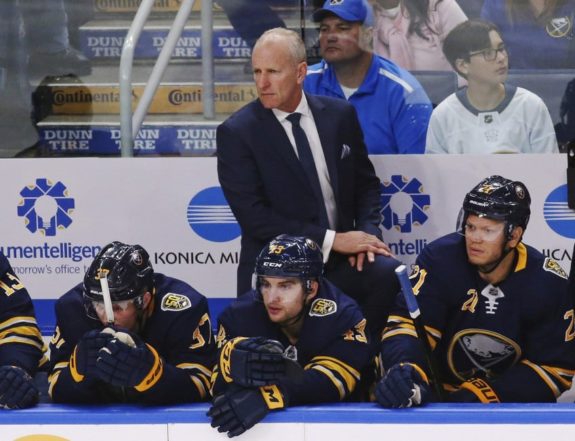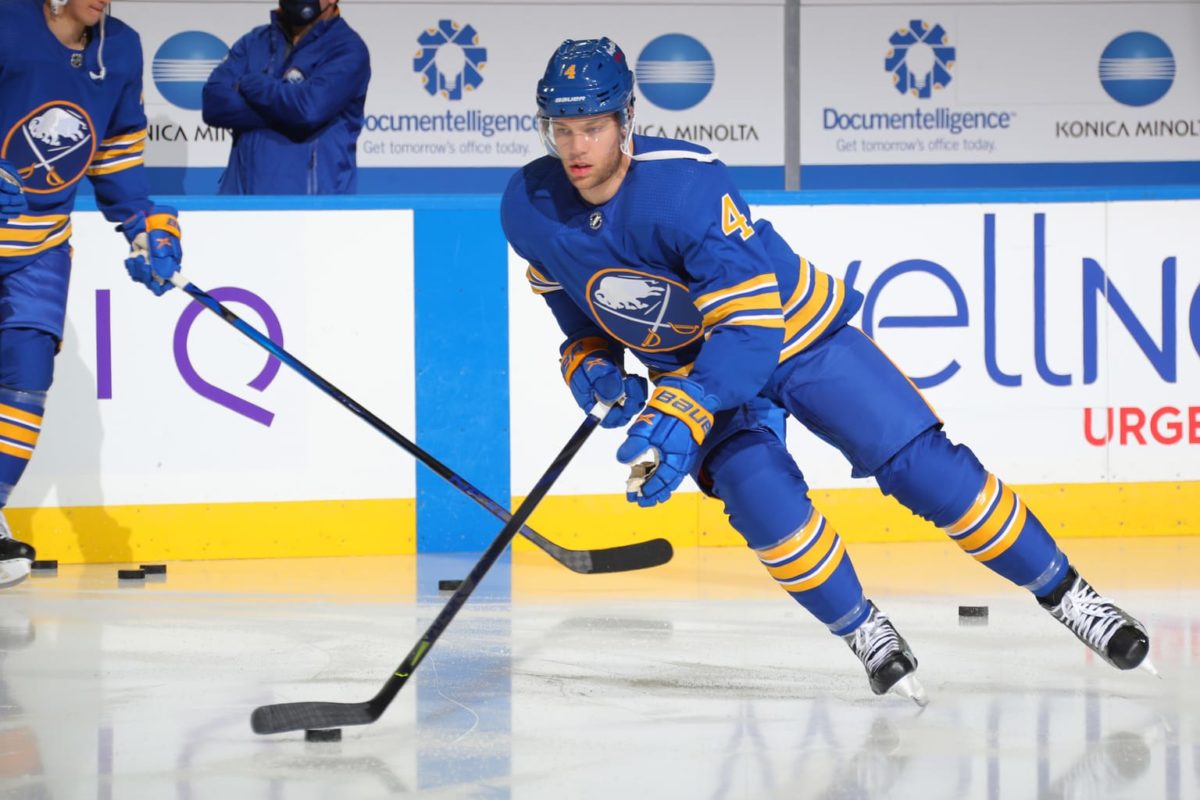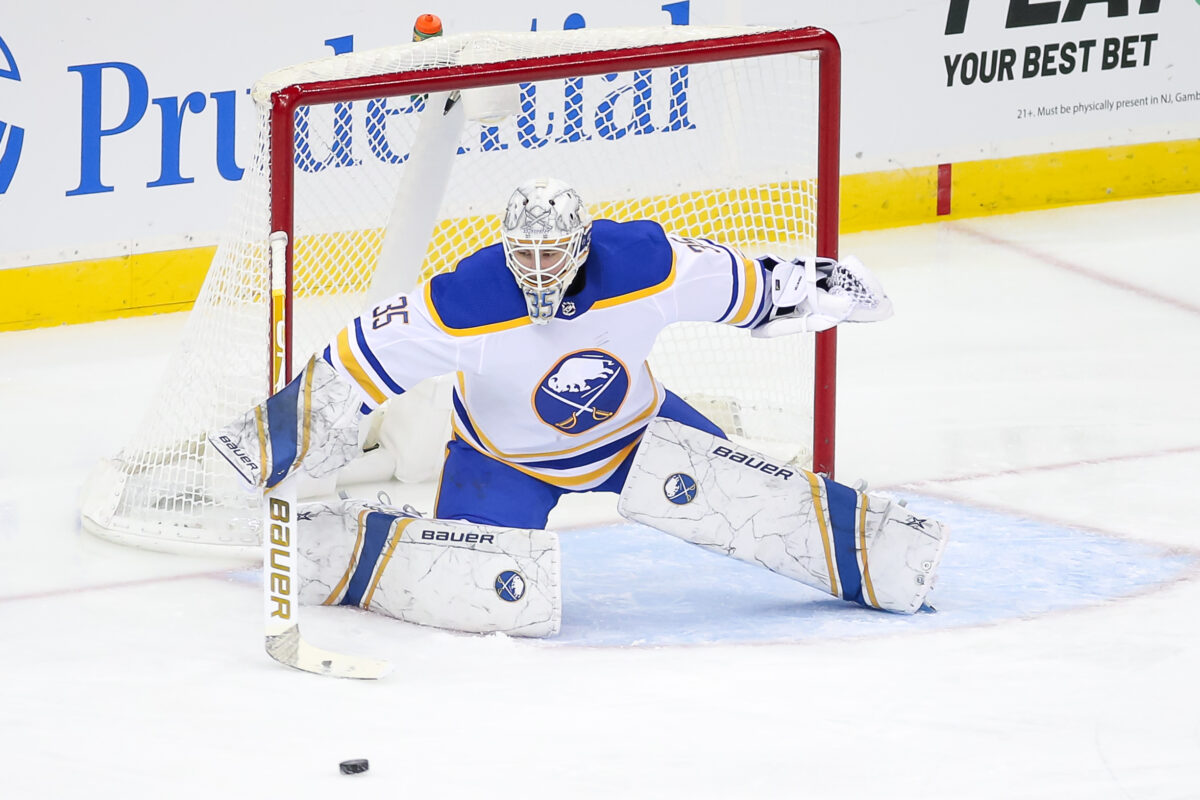While 16 NHL teams gear up for the Stanley Cup Playoffs to start shortly, the Buffalo Sabres watch from the sidelines for the 10th straight season, as the regular season wound to a close for them over the weekend. The Sabres, who posted a record of 15-34-7 for a total of just 37 points on the shortened 56-game season, finished dead last in the entire NHL for the fourth time in the past eight seasons and tied the record for the longest playoff drought in NHL history.
Some of you might be thinking, “Why on earth would I want to relive the Sabres’ 2020-21 season?” And I would understand where you’re coming from, believe me. But such is the nature of professional sports, especially for fans of franchises like the Sabres, who have consistently disappointed for over a decade, and counting. And, believe it or not, there are actually some positives to take away from this season – we’ll have to plow through all of the negatives first.
Sabres Started the Season Slow
The start of the season was all too familiar for Sabres fans. They lost their season opener, and then they lost their second game after that. Neither contest was out of reach, though, so not all hope was lost. Not yet, at least. The Sabres would go on to win just one of their first five games, and in a division as tough as the MassMutual™ East Division, they couldn’t afford to lose ground so early in the season.
While they put together a relatively impressive string of games early on, clawing their way to a roughly .500 record and flirting with the fourth spot in the division, that’s as close as they would get, as their world was about to come crashing down on them, never to recover. It would take the Sabres close to 30 games to win just their seventh game of the season, but we have some footwork to do before we get to that storyline.
Jack Eichel Trade Rumors & Injury
As is the case with any team that performs as poorly as the Sabres did this season, the rumor mill starts to spin regarding potential trades and individual players, and it doesn’t stop spinning. In this case, captain Jack Eichel got caught in the crosshairs of media speculation about if he might want out, if teams are calling general manager Kevyn Adams about a trade, etc. Thankfully, Adams put the rumors to bed, quelling any anxiety Sabres fans might have had.

However, the rumors continued to go on, with analysts saying that both the New York Rangers and Los Angeles Kings were interested in attempting to pull off a trade for Eichel. None of these rumors came to fruition, obviously, but there was a point where people in Buffalo were genuinely worried about the odds of this franchise-altering trade happening.
In an unfortunate turn of events, Eichel ended up suffering a season-ending injury in mid-March, keeping him out until next season and sparking an argument about whether or not he should get surgery to repair the injury, which would extend his recovery and rehabilitation process.
Eichel finished the season playing in just 21 games for the Sabres, scoring two goals and sixteen assists for 18 points. He was also a minus-9 and shot at a career-worst 3.3 shooting percentage, effectively making this his worst season since coming into the NHL in 2015.
Ralph Krueger’s Firing
Head coaches and the Sabres are two parties that haven’t been able to mesh for too long over the past decade, and former head coach Ralph Krueger was no different. Krueger, who had been out of work in the NHL since the shortened 2012-13 season, and came out of the woodwork as a leading candidate for the Sabres head coaching job last time it was vacant, lasted less than two seasons with the team, with many fans thinking even that was too long a time to hold on to him.
The coaching issues plaguing the Sabres bench this season weren’t anything new; in fact, the issues that ended up costing Krueger his job started as early as the middle of last season, his first with the team. One of the biggest criticisms of Krueger’s coaching style was his often bizarre lineup decisions, including playing winger Jeff Skinner on the fourth line and keeping him buried there. Players seemed to love him, but in the court of public opinion, Krueger was as good as gone, and that’s exactly the way it went.

After a long losing streak grew even longer, Krueger was on the hot seat, and it was only a matter of time before he was sent packing. It took the Sabres recording their 12th straight loss for Adams to fire Krueger, but the inevitable finally happened. Assistant coach Don Granato was named the interim head coach, where Adams said he would stay for the remainder of the season. The losing streak didn’t end there, though.
Sabres’ 18-Game Losing Streak
I did warn you that the losing streak didn’t end at 12 games. No, it lasted a bit longer than that, reaching an astounding 18 games. Technically, it is classified as a winless streak since some of the games went to overtime and the shootout, and it was enough to tie the longest winless streak in NHL history during the salary cap era. The 18-game winless streak also became the longest winless streak in Sabres franchise history too.
Granato did not get off to a good start behind the Sabres bench, but that was expected. Those who thought that Krueger was the root of all the team’s problems and firing him would work as a magic wand were deeply mistaken. There were simply too many vulnerable spots on this roster to compete against the teams in their division this season.
Granato lost his first six games as the interim coach after Krueger’s firing, but a noticeable change started to emerge during Sabres games: even though they were losing, they looked more competitive and more fun to watch. This all with Eichel being out and other players succumbing to injury, too. The late-season surge earned Granato some respect and love from the fanbase, to be sure.
Hall, Staal & Other Signings
Adams began his first season as GM by making a splash, acquiring some big names in the offseason through trades and free-agent signings. The two biggest moves were signing free agent Taylor Hall to a one-year, $8 million contract, and trading for Eric Staal from the Minnesota Wild.

Hall, a former first-overall pick of the Edmonton Oilers in the 2012 entry draft, was just two seasons removed from winning the Hart Trophy as a member of the New Jersey Devils, as the player deemed most valuable to his team’s success. On the other hand, Staal was one season removed from scoring 40 goals with the Wild and would finally bring that veteran center depth to the Sabres that they so desperately needed.
The other signings Adams made in the offseason were Tobias Rieder, Cody Eakin, and Riley Sheahan. It’s safe to say now that almost all of these players ended up being a disaster for the Sabres. Hall managed to score just two goals with the Sabres in 37 games and 19 points overall, recording a minus-21 rating. Staal notched just three goals, seven assists and 10 points, and a minus-20 rating in his 32 games with the Sabres.
At one point, the Rieder-Eakin-Okposo line was statistically the worst forward line in the NHL by a long list of measurable metrics, making even the smaller offseason signings look like total busts. The only player I would say really played well in his role was Sheahan, who hasn’t been as effective an NHL player as some would have predicted but didn’t hurt the Sabres every time he was on the ice.
Injury Bug Hit the Sabres Hard
In what was already a unique season with more potential pitfalls than usual due to the ongoing COVID-19 pandemic, the injury bug didn’t hold back from hitting the Sabres, either. They lost some key players to injury, some for very long stretches of time. I already mentioned Eichel’s season-ending injury, but the bad luck doesn’t stop there.
Starting goaltender, Linus Ullmark went down with an injury in the early part of the season that kept him out of the crease for over a month, which ended up being the first nail in the Sabres’ coffin this season. He came back briefly in April but fell to injury once again, this time one that ended his season. Ullmark won nine games out of his 20 starts for the Sabres, which is more than half of the total wins the team recorded all season long.

Goaltenders not named Ullmark combined for a 6-28-4 record, including Carter Hutton, Dustin Tokarski, Jonas Johansson, and Michael Houser. Suffice it to say that with Ullmark out, the Sabres are expected to lose games. Other players to get injured were defensemen Jake McCabe, who had his season ended less than 10 games in, Will Borgen, and Rasmus Ristolainen, who missed several weeks after a frightening bout of COVID.
Sabres’ Trade Deadline Fire Sale
As the NHL trade deadline drew closer and closer, it had been clear for some time that the Sabres were not going to be anywhere near the playoff conversation for the 10th straight season, a position they have grown to know quite well over the years. However, there was a different tone to this deadline as instead of just biting the bullet and “selling,” the Sabres looked poised to go full fire sale.
Most of Adams’ trades came before the actual deadline itself. He shipped out Johansson to the Colorado Avalanche for a draft pick, Staal to the Montreal Canadiens for two draft picks, and Brandon Montour to the Florida Panthers for a draft pick. The only deal actually made on deadline day was the biggest: Taylor Hall and Curtis Lazar to the Boston Bruins in exchange for Anders Bjork and a draft pick.
While fans will have to wait a number of years to see what the newly-acquired draft picks turn into, there are two different camps when it comes to assessing the return for the players Adams shipped out this season: either you think he did as well as he could, or you think he fetched an underwhelming return. I am of the latter camp and think the return for Hall was especially underwhelming. As I said, though, only time will tell.
Sabres Sit Outside the Playoff Race Again
The Sabres have a long summer ahead of them, and Adams and co. have all offseason to think about what kind of path they want to take to rebuild this team and what next season might look like. As they watch the playoffs from the outside looking in once again, it’s clear that changes must be made, or this franchise could delve even deeper into serious turmoil.
Adams took the first step in hiring Jason Karmanos as Associate GM, and next up is filling the vacant head coaching spot. After that, it’s down to the entry draft, Seattle Kraken expansion draft, and filling out the roster for next season.